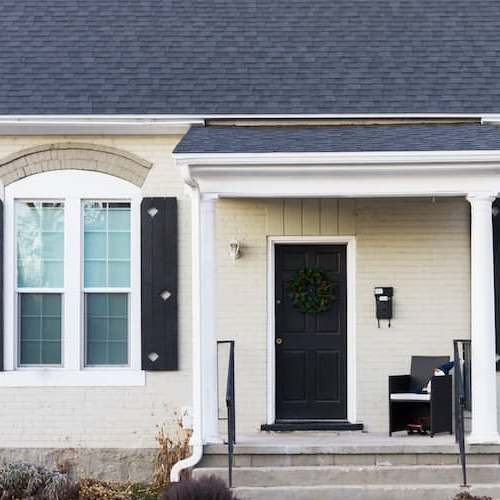Buying a house in the military as a single soldier
Contributed by Karen Idelson
Sep 5, 2025
•9-minute read
If you’re a single soldier who wants to start their homeownership journey, you’re probably wondering how to buy a house while in the military, if the military has home buying programs that help soldiers buy homes, and whether you can get a mortgage with just one income.
While they’re not going to present you with the keys to a new home, the military does offer soldiers a lot of support, such as the Basic Allowance for Housing (BAH) and VA loans. These can make buying a house in the military a lot more affordable.
Let’s dig deeper into how you can buy a house as a single soldier.
Income and debt considerations as a single buyer
Assuming you’ll want to take advantage of your access to a VA loan, there are important qualification details to familiarize yourself with. While every borrower’s circumstances are unique, you’ll want to make sure your credit history, income, and debt-to-income ratio (DTI) are in good shape since you’ll only have one income. Here are some general guidelines to consider.
VA loan income requirements
While the Veterans Administration doesn’t have any minimum income requirements, the lenders who offer VA loans do. They look for steady, reliable income that can cover the mortgage payments, homeowners insurance, property taxes, and other expenses. Basically, they want to make sure you can pay them back comfortably.
Debt-to-Income ratio (DTI)
Your DTI ratio is your monthly debt obligation, which includes things like mortgage, property taxes, homeowners insurance, personal and car loans, and credit card payments, divided by your monthly gross income, multiplied by 100 to get a percentage. Most lenders want that number to be 41% or lower.
General affordability guidelines
There’s another percentage you’ll want to keep in mind as well: 28%. That’s the maximum percentage of your monthly gross income that you can comfortably spend on housing, according to experts. This is part of your DTI. Things that count toward housing costs are such things as your mortgage, homeowners insurance, property taxes. Don’t count utilities, maintenance, or repairs.
The good news is, as a soldier, your Basic Allowance for Housing (BAH) can count as income. This improves your DTI ratio and your chances at loan approval. But remember, VA loans are issued by private lenders, who have their own income and DTI ratio guidelines. These guidelines will help you determine how much home you can afford with a VA loan. This is one reason it’s important to choose the right lender.
Factors to consider before buying a house as a single soldier
Qualifying for a loan is only one consideration to take into account when buying a house as a single soldier. Here are some other factors you should weigh heavily:
How long you’ll be stationed at a base
There are a lot of great reasons to buy a home, but as a soldier it’s not always up to you how long you’ll get to live in any one place. And while mortgages typically run for 30 years, with many running 15, the average service member receives new permanent change of station (PCS) orders every two to four years.
Fortunately, that’s not a deal-breaker when it comes to buying a house as a single soldier. There are options if you must move out of the home you own. You can:
- Sell the home. Typically, housing prices go up over time, so this could net you a profit.
- Rent it out long-term. If you can collect enough rent to cover the mortgage and other housing expenses, you could generate passive income – while renters pay down your mortgage.
- Rent it our short-term. You could turn your house into a vacation rental until you return or it’s a better time to sell.
Times it may be smart to buy
Buying a home is an important milestone toward wealth accumulation. Here are some times when buying as a single soldier might make sense:
- Buying is cheaper than rent. Research rents in the area where you want to buy. If they’re higher than the cost of mortgages, it might be a smarter choice to buy.
- You’ll be at your base for five years or more. If you don’t expect to move for at least five years, it might be smart to buy. You’ll build equity and odds are your home will appreciate.
- You’re fine with renting out your house. If you don’t know when you’ll be reassigned, but you’re comfortable with renting out your home in that event, buying might be a smart move.
The cost of rent in your area
An important thing to do is to compare the cost of rents in your area to the cost of buying a home. Try to compare houses that are very similar in square footage, number of bedrooms, location, and other attributes.
You should also factor in the fact that when you rent, you build no equity, as you do when you pay down a mortgage on a home you buy. So, even if renting is less expensive, it might not be the best move for you.
Rocket Mortgage® has a rent vs. buy calculator to help you decide.
The housing market in your area
Timing the housing market is not as tough as timing the stock market. There are tried-and-true indicators in real estate that tell you whether it’s a good time to buy. Here are three to look for:
- Appealing interest rates. Your mortgage interest rate is the cost of borrowing money. When it’s low, it keeps your monthly payment reasonable and allows you to buy more house for your money.
- Ample inventory. It’s economics 101. More supply means more affordability. When there are a lot of houses on the market can mean a buyer’s market.
- Renting is more expensive than buying. As mentioned, if it’s less expensive to buy a home in your market, owning a home gives you many advantages. You’ll build equity, enjoy tax deductions, and more.
Why take out a VA loan as a single soldier?
A VA loan is a mortgage guaranteed by the U.S. Department of Veterans Affairs. It’s available to active-duty service members, veterans, and surviving spouses.
VA loans provide a lot of benefits, including:
- Lower interest rates. VA loans often have lower interest rates than conventional loans.
- No down payment requirement. In many cases, you can buy a home with no money down. This can really help first-time buyers.
- No private mortgage insurance (PMI). PMI is a premium borrowers pay when they don’t put enough money down on a home, typically less than 20%. VA loans don’t require it.
- More lenient DTI ratio. The 41% DTI ratio VA lenders typically require is higher than many other loans. And VA loan lenders will sometimes go even higher.
How to get a VA loan as a single soldier
To get a VA loan, you’ll need to get a VA Certificate of Eligibility (COE) to apply for the loan, then meet specific lender requirements. Let’s break down the process.
1. Meet the Qualifications
You’ll need to meet eligibility requirements for both the VA and the private lender servicing the VA loan.
VA qualifications
If you’re on active duty in the military, you’ll need to have served for at least 90 continuous days to qualify for a VA loan. If you’re a National Guard or Reserve member, there are more nuanced requirements. But in general, you’ll need to have at least 90 days of active-duty service (including 30 consecutive days for National Guard members) or six creditable years.
Lender qualifications
Every lender creates their own requirements for VA loans. However, there are some common ones you should expect:
- Income. Lenders want to make sure you can comfortably pay them back, so they’ll want to see a history of steady income.
- Employment. Lenders want to see at least two years of stable employment.
- Reserve funds. These vary, with VA loans often not demanding reserve funds. However, it’s best to have three to six months of emergency savings.
- Credit score. Typically, lenders will want a FICO score of 620 or better.
- DTI. As stated, most lenders of VA loans want to see a DTI no greater than 41%.
2. Get your Certificate of Eligibility (COE)
To apply for a VA loan, you’ll need a COE. Here are the documents you’ll need:
- DD Form 214. This is also known as a Certificate of Release or Discharge From Active Duty form. You’ll need this if you’ve been discharged or are a current or former National Guard member.
- Statement of service. This is a letter signed by your commander, preferably on military letterhead. If you're on active duty, you’ll need this.
- Report of separation. If you’re a discharged National Guard or Reserve member, this will give a record of your periods served.
- Record of retirement points. This is for discharged National Guard or Reserve members and is a record of the retirement points you’ve accumulated.
- Proof of honorable service (for discharged Reserve members). The DD Form 214, DD Form 256, a Point Statement (such as the NGB-22), or any other discharge document that specifies an honorable discharge can be used for this purpose.
3. Choose a Lender and Get Preapproved
Once you’ve chosen a lender, it’s a smart idea to get preapproved for a loan. This will tell you how much house you can afford and let sellers know you are serious and able to buy their home. That can give you bargaining power.
For preapproval, the lender will vet your financial information, including your income. They’ll also want to know which house you want to buy, if you’ve got your eye on one. If everything checks out, they’ll give you a preapproval letter to show sellers.
4. Find a house and make an offer
Once you’ve found a house you love, you’ll want to make an offer. This is where a real estate agent is a big asset. An experienced agent can help you with the following:
- Put together a list of comps so you can determine a fair price and make a competitive offer.
- Determine the amount of the earnest money, which is money you’ll put down to show the buyer you’re serious.
- Choose reasonable contingencies to ask for. These include things like scheduling a professional home inspection, appraisals, and other necessaries.
5. Get an appraisal and inspection
All lenders require an appraisal before approving a loan, but lenders are especially strict about VA loan appraisals. They have a reputation for being rigorous to ensure that the homes in question are fiscally and structurally sound.
Similarly, your potential home will undergo a professional home inspection. Every system, such as plumbing and electrical, will be inspected, as well as the foundation and other critical points. Specific VA loan requirements include:
- A roof in good condition.
- Proper drainage.
- Working heating, ventilation, and air conditioning (HVAC) in certain regions.
- An adequate water supply.
6. Pay the VA funding fee
The VA funding fee is a one-time fee paid to the Department of Veterans Affairs (VA) that you’ll pay to acquire a VA loan. It helps offset the cost to the taxpayer for providing loans that don’t require down payments or private mortgage insurance (PMI).
If you are a veteran, active-duty service member, National Guard, or Reserve member, here’s what you’ll pay:
| Down payment | Fee for first-time VA loan borrower | Fee for non-first-time VA loan borrower |
|---|---|---|
| Under 5% | 2.15% of loan amount | 3.3% of loan amount |
| 5% to 9.99% | 1.5% of loan amount | 1.5% of loan amount |
| 10% or more | 1.25% of loan amount | 1.25% of loan amount |
7. Close on your home
The big day is finally here, when you’ll close on your loan. During closing expect to sign a lot of documents and pay closing costs. VA loan closing costs can be different than closing costs for conventional and other types of loans. They can include title fees, lender origination fees, the VA funding fee, specialized VA appraisal and inspection, and generally add up to between 3% and 6% of the amount of your loan.
FAQ: About buying a house as a single soldier
Can I buy a house while on active duty?
Definitely. In fact, thanks to technology such as DocuSign and virtual tours, you may be able to buy a home even when overseas. You also have the advantage of being able to apply for a VA loan.
How can I find houses for sale while on active duty?
Partnering with a real estate agent is a good idea whether you’re deployed or on base. Many homes for sale offer virtual tours to make house hunting easier.
The bottom line: Since only one income will be considered, good credit and income are key
Buying a house as a single soldier is possible, and with the help of VA loans, BAH, and prudent budgeting, it may be easier than you think. Since you’re relying on one income to get your loan approval, it’s good to check your credit score and DTI ratio to make sure they’re within favorable ranges set by your lender.
Rocket Mortgage® can help you get started with our fast, easy online VA loan application process.

Terence Loose
Related resources

6-minute read
How many times can you use a VA loan?
There’s no limit to the number of VA loans qualified borrowers can take out, but you usually can’t hold multiple VA loans at once. Let’s break...
Read more

8-minute read
Buying a second home with a VA loan
VA loans are designed to help military personnel, veterans, and their families buy a primary residence, but there are ways you can use one to buy a second home.
Read more

7-minute read
A guide to the types of VA loans
VA loans offer low-cost mortgages to veterans and active-duty service members. Discover the types of VA loans available and how to apply.
Read more